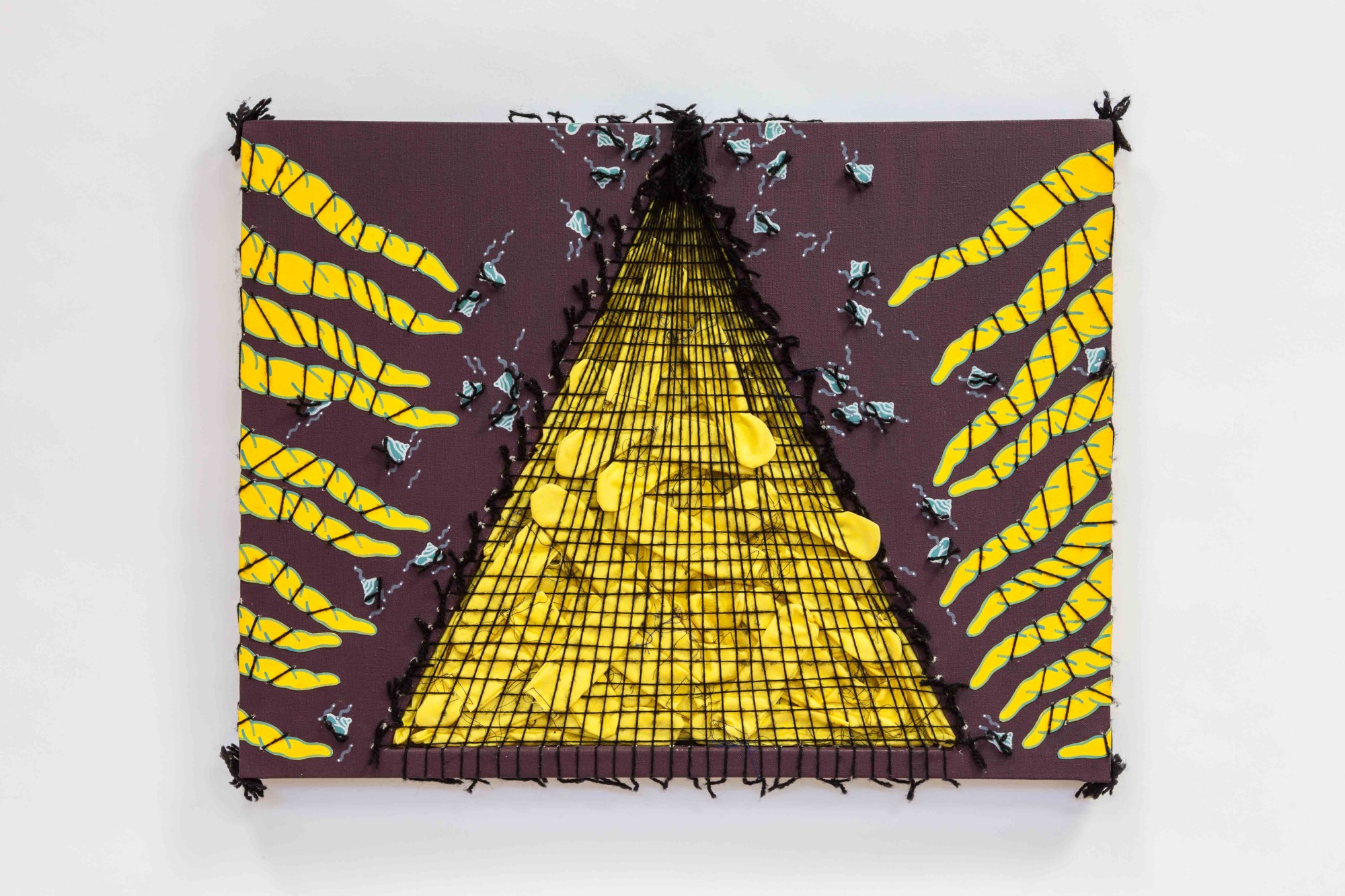Bursting with color, texture, and organic form, the intensely personal work of Franklin Williams (b. 1940 in Ogden, UT; lives and works in Petaluma, CA) sustains a tension between figuration and abstraction. In his rigorous yet whimsical artworks, Williams evokes familial and romantic love, death, sorrow, lust, and humor quite tenderly, with motifs and shapes intimately bound by a symbolism that has spanned the many decades of his studio-based practice. His complex canvases, sculptures, and works on paper incorporate painting and drawing with the needlework, crochet, and other fiber-based skills he learned from his family as a child in rural Utah. Working independently and nearly anonymously in Northern California, Williams has recently been reinvestigated as a precursor and contemporary of the Pattern and Decoration Movement, in addition to his longtime affiliations with California Funk, Nut Art, and various West Coast movements of the 1960s, 1970s, and 1980s. An autodidact who learned to read in his mid-30s while living with untreated dyslexia—even while teaching full time at the San Francisco Art Institute and California College of the Arts—Williams straddles a self-taught ethos suspicious of the international art world with a profoundly generous pedagogical career as a beloved teacher in the Bay Area.
This survey exhibition unfolds across the sixty years Williams has spent in a meditative, daily studio practice. Constructed in the 1970s by Williams and his wife, collaborator, and studio manager Carol Williams, his studio is a physical extension of the Petaluma home they purchased to raise their family. Walls are covered salon-style by his drawings, sculptures, and canvases which have been hung alongside objects and materials preserved from his childhood: quilts, furniture, and art made by his mother, father, and paternal uncle who all lived creatively fueled lives in their Utah communities. Raised in a home full of poetry and music, Williams was given his own “studio” as a young boy–a coal room that was renovated by his father. Even though Williams struggled in school with a yet-to-be diagnosed reading disability, his parents recognized his artistic brilliance and encouraged him to spend hours drawing. Throughout his childhood, the inevitabilities of life and family were approached by adults with a radical care and candor that has shaped the autobiographical direction of his work.
While size, scale, and palette have varied over the years, Williams’ artwork retains a vibrant, even eccentric, use of color shaped by his color vision deficiency (CVD), which produces variants in color recognition outside of what is considered normative. His canvases are also embedded with an intensity of emotion. The delights of fatherhood and deep love of his wife reveal Williams’ work as diaristic. Carol inspires much of his figuration and nearly all of the femme-reading bodies in paintings such as Twins (Part 1 & 2) (1976) and Standing Figure (c. 1990s). These erotically charged objects are devotional as they entwine love and sexuality into vividly hued human forms and bodily organs to become portraits of intimacy and marriage as well as moments of mourning. Several works in the exhibition mark intense periods of pain, such as the loss of an infant daughter in Baby Girl #2 (1970) and Baby Girl #4 (1971); the passing of Williams’ father in Last Gate (1982); and the looming death of his mother in Cutting Apron Strings (1982).
There are also joyous portraits of family [Pink Tea (1972)], as well as celebrations of the yearly international travel that punctuated their Petaluma life [Secret Sweet Slovakia (2020) and Portrait 5 (2015)]. Williams’ playfulness with materials, subject matter, and color has endured from the earliest soft sculptures included in the exhibition through his most recent paintings and drawings [Fez Feeds Lovable Beauty (2020) and Sensuous Submission (2021)]. Franklin Williams approaches artmaking as a nearly mystical process that channels what he refers to as “beauty, mystery, and myth” into visual form, capturing the highs and lows of a life immersed in love.
Franklin Williams: It’s About Love is his first solo institutional exhibition on the East Coast, is curated by The Bell’s Chief Curator Kate Kraczon, and will be accompanied by a catalog designed by Luminosity Lab.
